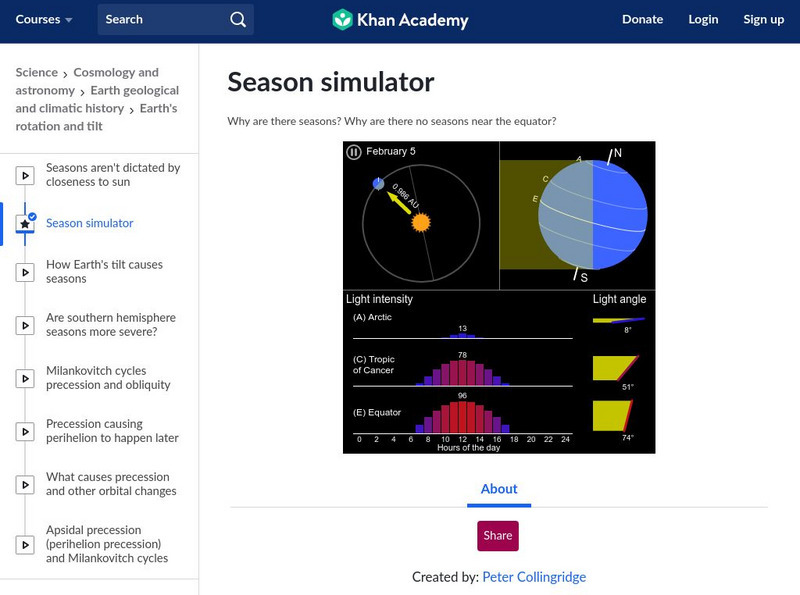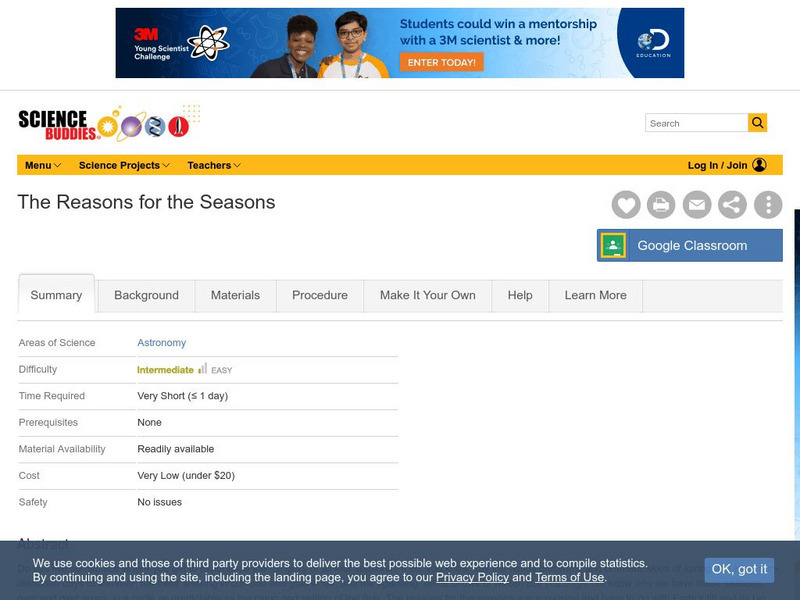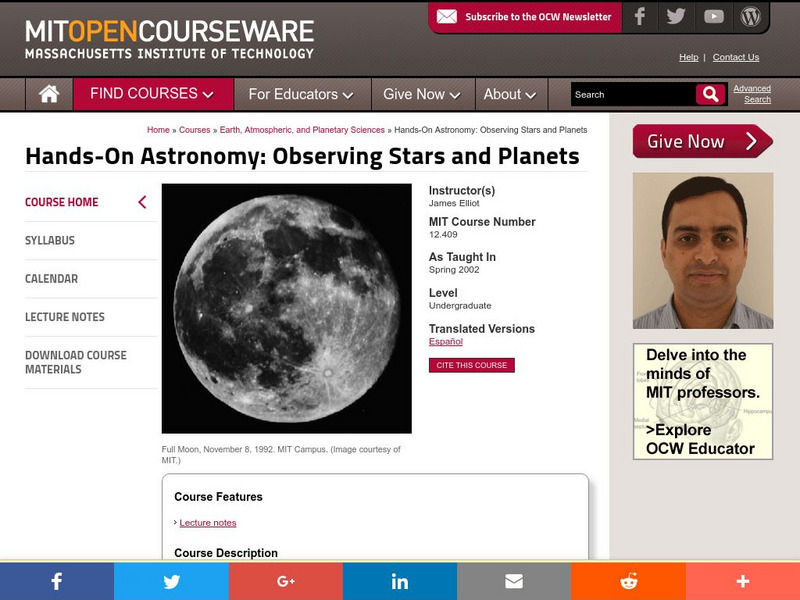Hi, what do you want to do?
CK-12 Foundation
Ck 12: Earth Science: Revolutions of Earth
[Free Registration/Login may be required to access all resource tools.] How objects in the solar system orbit around each other.
CK-12 Foundation
Ck 12: Earth Science: Revolutions of Earth
[Free Registration/Login may be required to access all resource tools.] How objects in the solar system orbit around each other.
Other
Fisher Science Education: Headline Discoveries Archive
What's new in the world of science? Find the latest articles about the newest discoveries and research in all the science disciplines: anatomy, astronomy, biology, biotechnology, chemistry, consumer science, environmental, forensics,...
American Geosciences Institute
American Geosciences Institute: Astronomy
Eight hands-on lessons module in which students explore the characteristics of planet Earth, its moons, the sun, the solar system, planets, and the difference between science fact and science fiction.
Khan Academy
Khan Academy: Cosmology and Astronomy: Season Simulator
This season simulator takes Earth through an entire year cycle allowing the viewer to observe the tilt of the Earth and the intensity of the sunlight.
Science Buddies
Science Buddies: Project Ideas: The Reasons for the Seasons
In this astronomy science fair project, investigate how the earth's axial tilt creates seasons. The Science Buddies project ideas are set up consistently beginning with an abstract, objective, and introduction, followed by a section on...
Georgia Department of Education
Ga Virtual Learning: Astronomy: The Earth
In this interactive tutorial students will learn what causes the seasons, diurnal cycles and how the constellations move through the sky. Learn we are able to see other planets and how astronomical events affected life on the Earth.
Other
Elementary Science Program: Astronomy, Gr. 5 8
"Astronomy is the science that studies the Earth, the Moon and other objects in space. It has helped us discover our place in the physical universe. It is still making discoveries." This landing page gives options for students and...
American Association of Physics Teachers
Com Padre Digital Library: Open Source Physics: Earth Orbit Model
Nicolaus Copernicus developed the theory of Earth's orbit around the sun demonstrated in this science simulation.
NASA
Nasa: Image Science Center: Ask the Space Scientist
A NASA scientist, Dr. Sten Odenwald, answers many students' questions. Topics include planets, galaxies, black holes, the origin of the universe, and common misconceptions about space.
Science Buddies
Science Buddies: Kinesthetic Astronomy: Longer Days, Shorter Nights
This kinesthetic activity demonstrates to students that the Earth's tilt is what is responsible for shifting light patterns and the change in seasons.
Cool Math
Coolmath: Science Monster: Earth
Read about the vital statistics, composition, and other facts about our home planet, Earth.
Cool Math
Coolmath: Science Monster: Pluto
A cool fact sheet about Pluto including a place for students to enter their weight on Earth to convert it to what it would be on Pluto.
Cool Math
Coolmath: Science Monster: Uranus
A cool fact sheet about Uranus including a place for students to enter their weight on Earth to convert it to what it would be on Uranus.
Cool Math
Coolmath: Science Monster: Saturn
A cool fact sheet about Saturn including a place for students to enter their weight on Earth to convert it to what it would be on Saturn.
Cool Math
Coolmath: Science Monster: Neptune
A cool fact sheet about Neptune including a place for students to enter their weight on Earth to convert it to what it would be on Neptune.
Cool Math
Coolmath: Science Monster: Jupiter
A cool fact sheet about Jupiter including a place for students to enter their weight on Earth to convert it to what it would be on Jupiter.
Cool Math
Coolmath: Science Monster: Mercury
A cool fact sheet about Mercury including a place for students to enter their weight on Earth to convert it to what it would be on Mercury.
Massachusetts Institute of Technology
Mit: Open Course Ware: Hands on Astronomy: Observing Stars and Planets
A university-level course in basic observational procedures in astronomy. Covers how to use a telescope, and includes lecture notes.
NASA
Nasa: The Space Place
This site is geared towards elementary learners, but most lessons can be modified for older learners. Space-related classroom activities, printable images of Earth and space, thought-provoking Space Place Musing podcasts and math-related...
Ducksters
Ducksters: Astronomy for Kids: Constellations
Kids learn about the constellations in the science of astronomy. These stars that form patterns when viewed from the Earth have been studied since ancient times.
Ducksters
Ducksters: Astronomy for Kids: Sunspots, Solar Winds, and Flares
Kids learn about sunspots, solar winds, and solar flares in the science of astronomy. What they are and how they affect Earth.
Enchanted Learning
Enchanted Learning: Zoom Astronomy
Where is our Solar System? How far away is the sun? What makes up the sun? Find out all you want to know about our solar system. This is a comprehensive on-line site about space and astronomy. Check out all of the excitement!
National Earth Science Teachers Association
Windows to the Universe
Windows to the Universe has developed an interactive resource about the earth, space, biological and physical sciences. Content includes information on our planet, the solar system, the universe, myths associated with space, space...



















